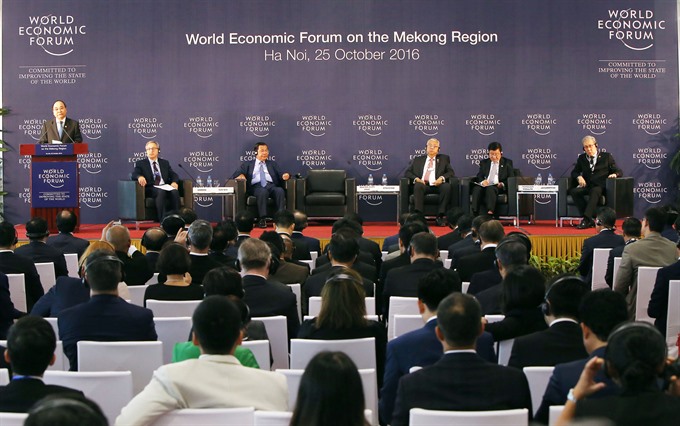 Politics & Law
Politics & Law

National and business leaders from five Mekong countries and other regions gathered yesterday at the World Economic Forum on the Mekong Region to discuss ways to boost economic integration and explore business opportunities.
 |
| Prime Minister Nguyễn Xuân Phúc (standing) addresses the opening ceremony of the World Economic Forum on the Mekong Region yesterday in Hà Nội. — VNA/VNS Photo |
HÀ NỘI – National and business leaders from five Mekong countries and other regions gathered yesterday at the World Economic Forum on the Mekong Region to discuss ways to boost economic integration and explore business opportunities.
The conference, entitled “Making the Mekong Mighty: Driving investment into fixed capital, human capital and network capital”, focused on infrastructure, trade and investment, industrialisation and inclusive growth and the impact of the ongoing industrial revolution on the regional economies.
Addressing the opening session, Việt Nam’s Prime Minister Nguyễn Xuân Phúc highlighted the important position and role of the Mekong region in Southeast Asia and the Asia-Pacific region.
“The Mekong Region is an important hub in Asia, and a very promising market with a population of 240 million and an aggregated GDP exceeding US$660 billion,” he said.
The PM, however, pointed out some challenges that the region is facing.
“The development gap of the Mekong economies and other economies within ASEAN remains wide, low wages are losing their advantage, and climate change has evolved ahead of forecasts,” he said.
The PM said it was in the common interest of all to develop the Mekong region into "a politically stable, economically dynamic environmentally sustainable and socially harmonious area."
To that end, the PM suggested the regional countries boost economic connectivity, develop and connect infrastructure systems, and create favourable conditions for trade, investment and tourism, increase co-operation to achieve sustainable development, including sustainable management and usage of water resources in the Mekong River. Innovation and creativity should also be prioritised to increase productivity and take advantage of the on-going fourth industrial revolution, he added.
“Mekong countries cannot rely only on natural resources extraction and unskilled labour, but need to invest heavily in innovation and creativity to strengthen competitiveness and move up the global supply chain,” he said.
Addressing the forum, leaders from other Mekong countries, including Cambodia, Laos, Myanmar and Thailand, and other participants emphasised the Mekong region’s potential to become a major regional and global centre of production.
They also raised proposals to increase economic and infrastructure connectivity, especially transport systems in sub-regional economic corridors.
On the industrial revolution sweeping the globe, participants agreed that for Mekong countries, this revolution brings about many opportunities for accelerating industrialisation and narrowing the development gap, but also creates many challenges.
The rapid development of new technology particularly benefits farmers and small enterprises as it helps them to better connect with the outside world, according to participants.
To tackle the challenges that arise, “Mekong countries have no other choice but to increase investment in high-quality human resources and encourage innovation and creativity,” said Việt Nam’s Deputy Prime Minister and Foreign Minister Phạm Bình Minh in his closing remarks.
The deputy PM also said Mekong countries should take advantage of global and regional economic pacts to effectively join in global supply chains to promote economic growth and ties with the rest of the world.
He expressed his hope that Việt Nam can work together with WEF to create an opportunity for promoting public-private dialogue and partnerships to further develop the Mekong region.
“Việt Nam is committed to working closely with the Mekong countries to create an enabling environment for companies to do business in the region,” he pledged.
— VNS




